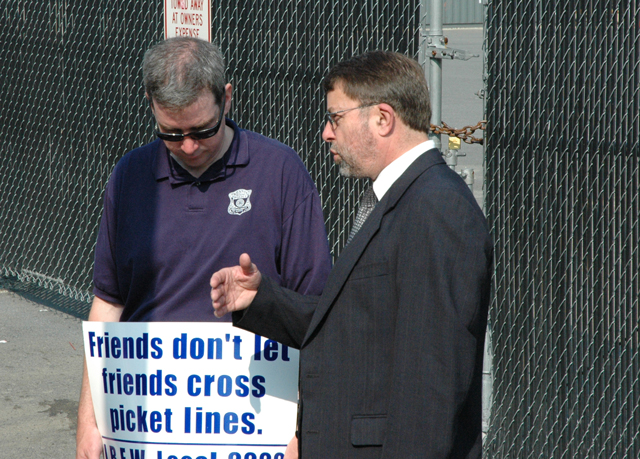ONLINE NEWS MAGAZINE SALON INTERVIEWS SANDULLI GRACE ATTORNEY ON RECENT SUPREME COURT DECISION ON UNION’S RIGHT TO STRIKE
Following the June 1, 2023 Supreme Court decision in Glacier Northwest Inc. v. International Brotherhood of Teamsters Local Union No. 174 (No. 21-1449), the online news magazine Salon reached out to Sandulli Grace for expert commentary. In an 8-1 decision, with Justice Amy Coney Barrett writing the majority opinion, the Court ruled against the Teamsters Union and in favor of the employer in a dispute involving the right to strike and federal preemption law. The union had called a strike of its employer, who makes and delivers concrete to construction sites, at a time designed to inflict maximum economic damage and thus increase their bargaining power. But the employer cried foul, saying the union went too far, and tried to sue the union for damages in court for the loss of property caused by the strike when unused concrete hardened and became useless. The union, in response, filed a complaint at the National Labor Relations Board alleging that the employer’s lawsuit was a form of anti-union retaliation. Normally such state law damages suits are preempted by federal labor law (a doctrine known as Garmon preemption after the 1959 Supreme Court decision in San Diego Building Trades Council v. Garmon, 359 U.S. 236 (1959)), but there is a narrow exemption for situations in which the union deliberately damages employer property. The Supreme Court, overturning an appeals court ruling, found that the union’s actions in this case met the exception and the employer could proceed to sue the union in state court.
Attorney John M. Becker, who has practiced law on behalf of unions and employees at Sandulli Grace since 1996, responded to Salon’s request for comments. The article may be found here. While the Salon article contains only abbreviated comments by Attorney Becker, his complete responses to Salon’s interview questions may be found below.
Salon.com: What were your initial reactions to the Court’s findings?
Becker: I’m disappointed but not surprised. This is a conservative court that, in general, prefers the rights of employers over the rights of unions and employees, and the rights of states over the rights of the federal government, and is highly skeptical of the power of federal agencies – witness the recent EPA decision (Sackett vs. Environmental Protection Agency, No. 21-454, decided May 25, 2023). The Court in this case (at the motion to dismiss stage, when the court must defer to the allegations in the complaint) makes factual determinations about whether the strikers crossed the line from inflicting economic harm through their strike (which is the point of a strike, as Justice Jackson points out!) to taking affirmative steps to destroy employer property. This is a job for a fact-finding agency like the NLRB, not an appellate court, much less the Supreme Court of the United States. I think the decision could (as Justice Blackmun warned – see Justice Jackson’s footnote 5) tempt lower courts to delve more into the facts of these cases, instead of leaving that task to the NLRB, which Congress created to conduct investigations and provide fact-finding and legal expertise on labor issues.
On the positive side, Garmon preemption has survived. That’s a good thing. And as Justice Jackson points out, the courts that will hear this case after remand can (and should) look to the NLRB’s findings in this matter as important evidence to determine whether preemption is still necessary. This case – both in the Washington State courts and the NLRB – is far from over.
Salon.com: Break it down for a layperson. What’s happening here, and why is it important?
Becker; Although most unions in the private sector have a right to strike, which includes the right to decide when to strike, they can’t go out of their way to destroy the employer’s property. Strikes are designed to have an economic impact on the employer – if there was no potential for economic harm, then why strike? That’s the whole point: put pressure on the employer to settle the contract. So if you walk off the job at a chicken factory and the chicken goes bad, that’s permitted. But at some point, you go from letting the economic harm happen, to actively making it happen. Here, the Court said that by waiting until the trucks were all full of wet concrete and then leaving the trucks with concrete inside them (concrete that eventually hardened and became useless), the strikers crossed the line from allowing economic harm to actively causing it, which is not OK.
What’s the legal consequence of that finding? It means that the employer can sue the union in state court for damage to its property. If there was a reasonable argument that the union had NOT crossed the line, then the state damages claim would be put on hold until the NLRB (the federal labor agency) made a ruling on the legality of the strike. If the NLRB said the strike was legal, then the employer’s damages suit would be dismissed. If the NLRB said the strike was illegal, then the employer’s suit could go forward.
Why is this decision important? It’s important to employers because they can use this ruling to try to persuade state courts to find that strikes were illegal so they can sue unions for damages caused by the strikes. The Supreme Court’s decision gives lower courts a little more permission than before to dig into the facts (or alleged facts) to make findings about who did what in the strike. The threat of more state court lawsuits against unions for destruction of property might cause some unions to think twice before striking. On the other hand, the case is important to unions because they can say that the law didn’t really change that much. Garmon is still good law. The exemptions to preemption for certain narrow categories of cases already existed before this case and this case didn’t expand the list of exemptions. Unions should be concerned, however, about the way that SCOTUS is signaling a willingness to do an end run around the NLRB in confronting the facts of these cases, instead of showing proper deference to the agency charged by Congress with administering the labor laws. We’ll have to wait and see what future cases bring.
Salon.com: Many were surprised by the Court’s split, with the final verdict being an 8-1 breakdown with only Justice Jackson dissenting. Why do you think the Court sided this way?
Becker: I think the majority decision by Justice Barrett manages to decide the case on its facts without overturning any precedents and that narrow focus appealed to all but the most conservative members of the Court. I think there was a fear that the Court might take this opportunity to overturn Garmon or otherwise more significantly limit the power of the NLRB (a desire expressed in the concurring opinions), and Justice Barrett’s approach was seen as a middle road (from the union perspective, losing the battle but not the war). Justice Jackson’s dissent would give more power to the NLRB than under current law by requiring courts to find that an NLRB complaint establishes a per se rule that a state law claim “arguably” implicates federal labor law and thus requires what Justice Jackson calls a “Garmon pause” before proceeding further on a state law claim. Although I agree that the policy proposed by Justice Jackson would be better for unions than the current rule (for the reasons she expressed), I understand why Justices Sotomayor and Kagan chose to join Justice Barrett. With Justices Thomas, Alito, and Gorsuch willing to go even further in an anti-labor direction, and the impossibility of getting five votes for Justice Jackson’s position, creating a majority for Justice Barrett’s position was a sensible strategic move to avoid a worse result.
Salon.com: Did you have any reaction to Justice Jackson’s emphatic dissent? What does this say about her as a justice?
Becker: I was heartened by Justice Jackson’s dissent. She displays a true understanding of and respect for the important role of the NLRB in adjudicating labor disputes, and of the crucial role that strikes play in labor-management relations. The strike is the single most powerful tool in a union’s toolbox, and decisions that weaken that power, even a little, upset the careful balance between union and employer interests. At a time when the Republican Party (and a certain portion of the electorate) perceives unions negatively, Justice Jackson’s robust affirmation of the important role unions play in the American economy is a breath of fresh air. I wish we lived in a world where Justice Jackson could get four more votes for her position, but we don’t.











